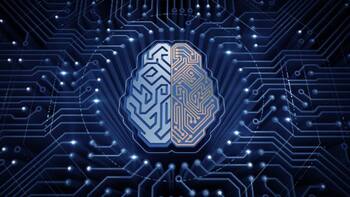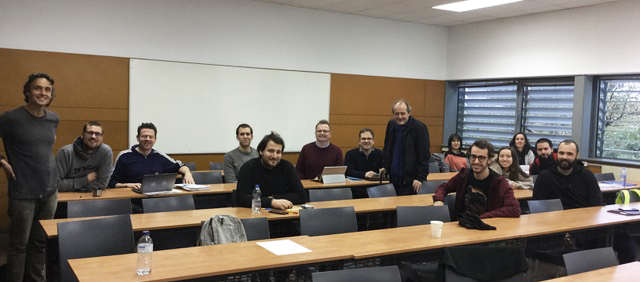Quantum Error-Correcting Codes
Quantum Error-Correcting Codes
Dates
January 21st
10:30-12:30 and 14:00-16:00
January 23rd
10:30-12:30 and 14:00-16:00.
Location
Universitat Politécnica Catalunya
Room 101
Facultat de Matemàtiques i Estadístiques.
Carrer de Pau Gargallo, 14,
08028 Barcelona
Lecturers: Simeon Ball (UPC) and Felix Huber (ICFO)
Course Description
When storing or transmitting data, the data can be corrupted. Classical error-correcting codes have been used since the 1960’s to detect and correct these errors. Quantum mechanics allows for the storage of data on quantum particles which are also susceptible to corruption. Thus, the need for quantum error-correction. This course will be an introduction to quantum codes which will assume no prior knowledge of quantum mechanics or error-correcting codes. We will focus for a large part of the course on stabiliser codes which have an analogue in classical error-correcting codes. This will give us an opportunity to delve into classical error-correction too and it will turn out that some constructions of quantum codes can be lifted from the classical case. We will also discuss how certain stabiliser codes are equivalent to geometrical objects which occur in finite projective spaces.
The target audience are graduates and faculty staff. It is expected that some of the students who have taken the coding theory option in the masters course will be interested. It is also aimed at the many researchers in the Barcelona area who are working on combinatorics, coding theory and information theory.
Lecturers
Simeon Ball (UPC) and Felix Huber (ICFO)


Dates
January 21st, 23rd, 28th, 30th, 2020.
Two hours each session.
Location
Universitat Politècnica de Catalunya (TBC)

Course Description
When storing or transmitting data, the data can be corrupted. Classical error-correcting codes have been used since the 1960’s to detect and correct these errors. Quantum mechanics allows for the storage of data on quantum particles which are also susceptible to corruption. Thus, the need for quantum error-correction. This course will be an introduction to quantum codes which will assume no prior knowledge of quantum mechanics or error-correcting codes. We will focus for a large part of the course on stabiliser codes which have an analogue in classical error-correcting codes. This will give us an opportunity to delve into classical error-correction too and it will turn out that some constructions of quantum codes can be lifted from the classical case. We will also discuss how certain stabiliser codes are equivalent to geometrical objects which occur in finite projective spaces.
The target audience are graduates and faculty staff. It is expected that some of the students who have taken the coding theory option in the masters course will be interested. It is also aimed at the many researchers in the Barcelona area who are working on combinatorics, coding theory and information theory.
LecturerS
Simeon Ball (UPC) and Felix Huber (ICFO)
BGSMath Organisers
Simeon Ball (UPC)
Contents
1. Introduction: Hilbert spaces, linear operators, Pauli matrices, error groups.
2. Quantum codes: error detection and correction, stabiliser codes, classical analogue.
3. Geometry of classical and quantum codes.
4. MacWilliams identities; classical, stabiliser and quantum codes.
5. MDS codes: classical, stabiliser and quantum codes.
2. Quantum codes: error detection and correction, stabiliser codes, classical analogue.
3. Geometry of classical and quantum codes.
4. MacWilliams identities; classical, stabiliser and quantum codes.
5. MDS codes: classical, stabiliser and quantum codes.
References
David G. Glynn, T. Aaron Gulliver, Johannes G. Maks and Manish K. Gupta “The Geometry of Additive Quantum Codes” available at
https://www.academia.edu/17980449/The_geometry_of_additive_quantum_codes
Avanti Ketkar, Andreas Klappenecker, Santosh Kumar, Pradeep Kiran Sarvepalli, “Nonbinary stabilizer codes over finite fields” available at
https://arxiv.org/abs/quant-ph/0508070
https://www.academia.edu/17980449/The_geometry_of_additive_quantum_codes
Avanti Ketkar, Andreas Klappenecker, Santosh Kumar, Pradeep Kiran Sarvepalli, “Nonbinary stabilizer codes over finite fields” available at
https://arxiv.org/abs/quant-ph/0508070
D. Gottesman, ”An Introduction to Quantum Error Correction and Fault-Tolerant Quantum Computation” (2009), available at
https://arxiv.org/abs/0904.2557
W. J. Martin, ”A physics-free introduction to quantum error correcting codes”
{\em Util. Math.}, {\bf 65} (2004) 133–158.
